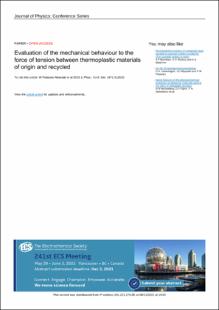Evaluation of the mechanical behaviour to the force of tension between thermoplastic materials of origin and recycled
Artículo de revista
2020-11-05
Journal of Physics: Conference Series
Colombia
The use of plastic products and polymeric matrix compounds is increasing in engineering, most of these materials are subjected to dynamic loads, therefore, are constantly evaluated according to experimental methods that allow a characterization of their main properties. Therefore, this research work consisted in carrying out the characterization of mechanical properties of thermoplastic materials of different origin; commercial and recycled, where three cases were worked: Polymethylmethacrylate, polyvinyl chloride and polypropylene, for which there were 3.5 ± 0.1 mm thick sheets, manufactured by extrusion and supplied by a local supplier, in the city of San José de Cúcuta, Colombia. Afterwards, the specimens or samples were cut for the tension test adapting the shape and geometry, according to the standard test method for tensile properties of plastics, ASTM D638-14, using laser cutting for such purpose, the specimens were conditioned at a temperature of 20 °C during 40 hours prior to the moment of the tension test, the equipment used was a universal machine branded from Electro Mechanical Instrument & Components Corp., commercial reference DL2000 N° 11760 NS 784 with a speed adjustment of 5 mm/min to keep within the times given by the standard. Once the tests are performed, the stress/strain graphs of each case studied are obtained and the experimental results are analyzed from the data provided by the software "Tesc versão 4.00". Afterwards, Young's module is statistically analyzed and compared in each study, seeing which one presents the best behavior under the studied load conditions, raising a hypothesis, where the question is if the differences in the sample between Young's module can come from a population with an mean of zero, in this case, it is concluded that there is no difference between Young's modulus values for polymethylmethacrylate samples, the same occurred for polyvinyl chloride and polypropylene.
Descripción:
Evaluation of the mechanical behaviour to the force of tension between thermoplastic materials of origin and recycled.pdf
Título: Evaluation of the mechanical behaviour to the force of tension between thermoplastic materials of origin and recycled.pdf
Tamaño: 728.5Kb
 PDF
PDF
 LEER EN FLIP
LEER EN FLIP
Título: Evaluation of the mechanical behaviour to the force of tension between thermoplastic materials of origin and recycled.pdf
Tamaño: 728.5Kb
 PDF
PDF
 LEER EN FLIP
LEER EN FLIP















